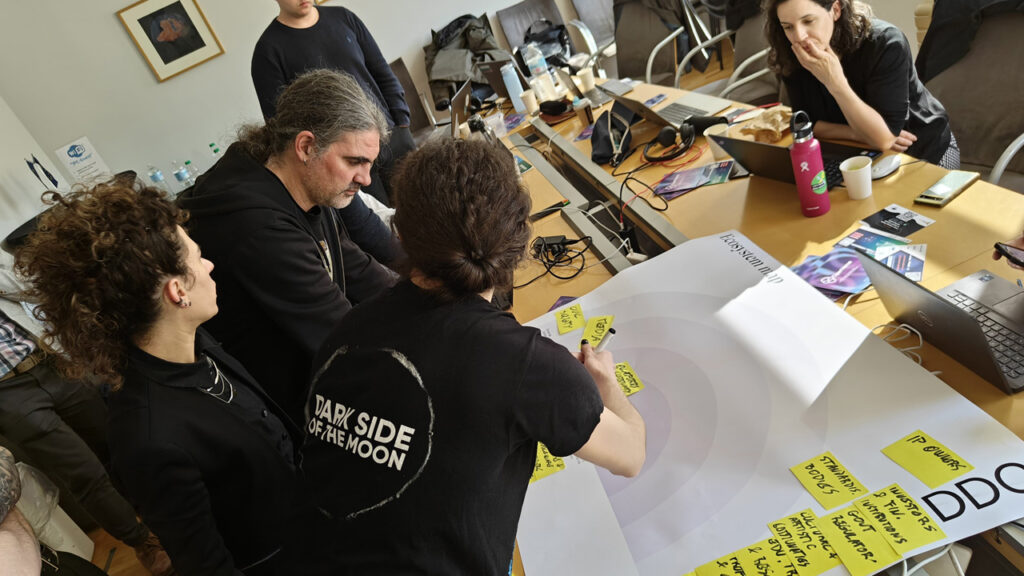Last week, the partners of the OPENVERSE project gathered in person for a two-day General Assembly at the Lisbon Council premises. This in-person meeting served as a vital platform to foster decision-making, and collaboration among the consortium members. It provided a unique opportunity for the partners to present updates on their individual activities, highlight progress made thus far, and discuss any challenges faced in their respective workstreams.
Additionally, the assembly allowed for a thorough reassessment of the project’s overall strategy, ensuring alignment and refinement of goals. A key component of the discussions was the review of the project’s mitigation strategy, where partners worked together to address potential risks, identify solutions, and strengthen the project’s resilience moving forward. By coming together in this setting, the partners were able to solidify their collective vision and ensure that the project remains on track to achieve its objectives efficiently and effectively.

This project takes place during a period of significant change, and OPENVERSE partners are committed to delivering value to end-users. This is why, to conclude the event, the project coordinators at the Lisbon Council led an ‘Ecosystem Mapping’ exercise. This involved re-identifying the key actors within the stakeholders of the Virtual Worlds ecosystem and defining the role of each actor.
Within the Virtual Worlds ecosystem, a diverse set of actors shape and influence the development and evolution of these spaces. From ‘Virtual World Platforms & Developers’ to ‘Industry Alliances & Consortiums’ which bring together stakeholders to drive collaboration and innovation. From ‘Hardware and Device Manufacturers’ play a crucial role by providing the necessary tools for immersive experiences ‘Telecommunication/Network Providers’ who ensure that the digital infrastructure and connectivity needed to support vast virtual spaces is strong and reliable. But also while ‘Independent Creators’ contribute to unique content and experiences to ‘Service and Platform Integrators’ who connect various virtual systems and services and also ‘Enthusiasts’ who drive community engagement and bring a sense of passion and innovation to the spaces they inhabit, to name a few. The exercise fostered a “customer-centric” perspective on the OPENVERSE asset offering, while ensuring that all OPENVERSE consortium members maintained a shared group identity, even after delving into the details of each aspect.
“Last week’s ecosystem mapping workshop in Brussels offered valuable insights into the evolving landscape of virtual worlds, highlighting the importance of clearly positioning different actors and understanding their roles. Particularly compelling was the recognition that actors often wear multiple hats in these ubiquitous digital spaces—an aspect that presents both challenges and unique opportunities for developing deeper relationships and more robust value chains”, explained Alessandro Paciaroni, Public Sector Innovation and Digital Government Expert at the Lisbon Council.
About OPENVERSE
OPENVERSE is a three-year Horizon Europe Coordination and Support Action. Its partners represent a blend of research institutions, technological enterprises, and innovative organizations from across Europe. Each brings their distinct expertise to this collaborative venture, ensuring its success and influence in shaping the future of the Virtual Worlds. Consortium partners are The Lisbon Council for Economic Competitiveness and Social Renewal (Belgium) – project coordinator, IDC (Italy), Martel Innovate (Switzerland), Trust-IT (Italy), COMMpla (Italy), Inspiring Futures (Switzerland), Politecnico di Milano – Department of Design (Italy), University of Galway (Ireland), Vrije Universiteit Brussel (Belgium), XR4Europe (Belgium), International Data Spaces Association (Germany), Data AI and Robotics (BDVA) (Belgium).
